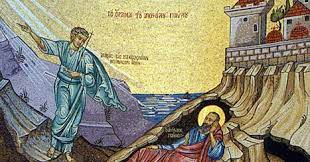 St Alban’s Episcopal Church Bolivar, Missouri Tuesday, May 17, 2022 Sixth Sunday of EasterActs 16:9-15  The first reading for next Sunday Acts 16:9-15 During the night Paul had a vision: there stood a man of Macedonia pleading with him and saying, “Come over to Macedonia and help us.” When he had seen the vision, we immediately tried to cross over to Macedonia, being convinced that God had called us to proclaim the good news to them. We set sail form Troas and took a straight course to Samothrace, the following day to Neapolis, and from there to Philippi, which is a leading city of the district of Macedonia and a Roman colony. We remained in this city for some days. On the sabbath day we went outside the gate by the river, where we supposed there was a place of prayer; and we sat down and spoke to the women who had gathered there. A certain woman named Lydia, a worshiper of God/a God-fearer, was listening to us; she was from the city of Thyatira and a dealer in purple cloth. The Lord opened her heart to listen eagerly to what was said by Paul. When she and her household were baptized, she urged us, saying, “If you have judged me to be faithful to the Lord, come and stay at my home.” And she prevailed upon us.  Consider this: It is a “man” Paul sees in a vision urging him to “come over to Macedonia and help us.” But when he gets there he stays many days without any man paying much attention to him; it is an apparently unattached woman, and a wealthy business woman at that, who listens and become a believer. They went out to where they expected there might be a a “place of prayer” by the river. There is no synagogue. What he finds is a group of women – among them a woman who is called, in some translations, a “God-fearer” or in the NRSV, a “worshiper of God.” This suggests that she has heard of the God of Israel, and attempts to follow him without actually converting to Judaism. Paul does what Jews would not usually do, and what Jesus was criticized for doing. He and his companion sit down with the women. Not only that, but he speaks to them, preaches to them as if they were equal to men in their capacity to hear and understand and decide for themselves what to think about it. He treats her the way Jesus treated Mary, Lazarus’ sister, or the Samaritan woman at the well. He makes a point that she was a wealthy woman, a “dealer in purple cloth,” from the city of Thyatira, where it was made. She has a “household”, but not husband is mentioned. Perhaps he had died. Perhaps she was a single woman with servants. But in any case, she alone decides to be baptized, and to have her whole household baptized as well. It is not a concept many of us quite grasp, but the head of household did make decisions about the religious lives of their entire household – and this is not the only time we see it in Acts. And when she, the first believer in Macedonia, urged them to stay with her, they agreed. Her house became the first church in Macedonia. Why do you suppose that most of the early Christian art and sermons featured Paul receiving the vision of a man begging them to come – and not the independent Lydia who is the actual first believer? And why do you suppose Luke left that part in – emphasizes her open heart, her wealth and independence, and her hospitality? |

Categories:
Tags:
No responses yet